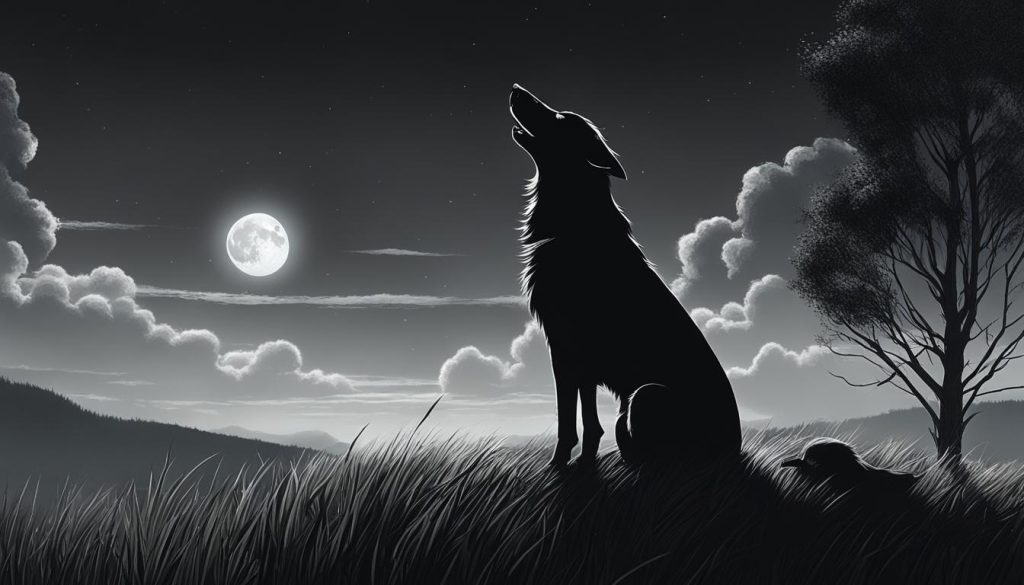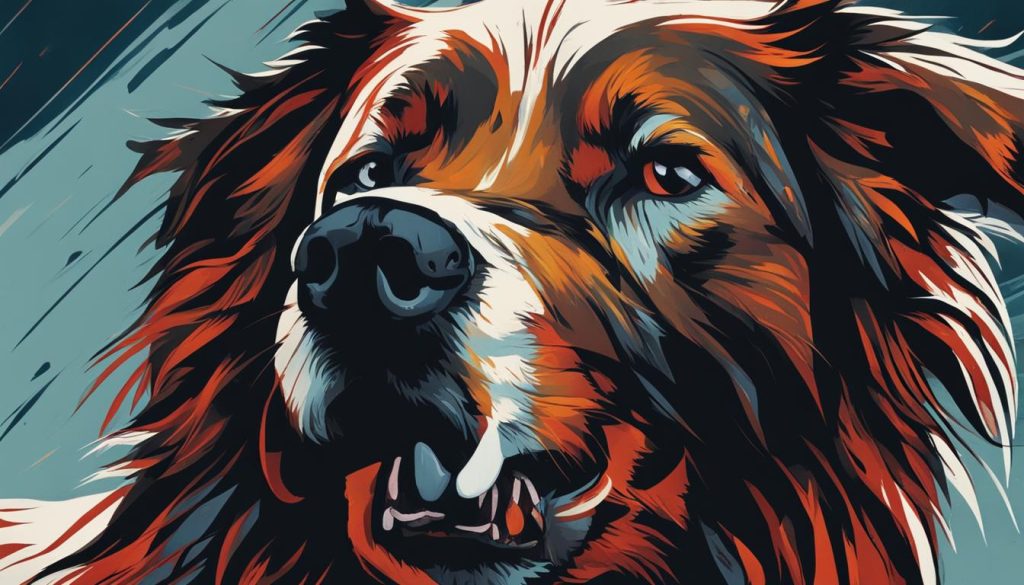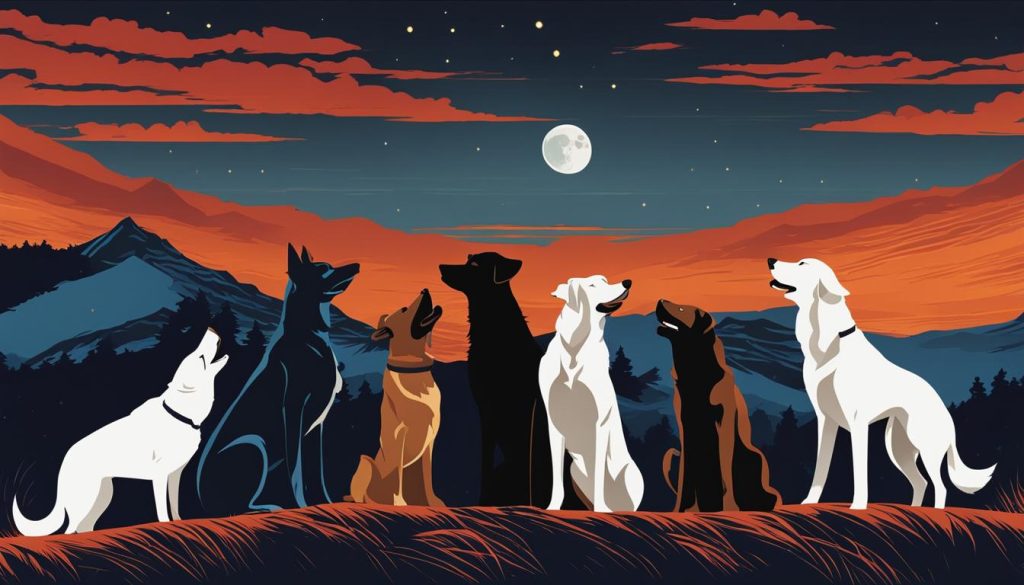Howling is a common behavior in both wolves and dogs, but the reasons behind it may differ. Wolves howl to communicate with their pack and establish territory, while dogs have their own distinct social system. However, there are similarities between dogs and wolves when it comes to howling. Dogs use howling as a form of communication, just like barking or growling. It serves as a signal to get attention, communicate with people or other dogs, express emotions, convey pain or discomfort, respond to triggering noises, and more. Some cultures believe that a dog’s howl predicts death, but there is no conclusive proof for this. Certain breeds, such as Siberian Huskies and Chow Chows, are more prone to howling. Overall, understanding why dogs howl can help us better appreciate their behavior and messages.
Key Takeaways:
- Howling is a natural behavior in both wolves and dogs.
- Dogs howl to communicate, express emotions, and respond to triggering noises.
- Certain breeds are more prone to howling than others.
- Understanding the reasons behind a dog’s howling can help better interpret their messages.
- There is no conclusive proof that a dog’s howl predicts death.
Howling as a Communication Signal
Dogs have a unique way of communicating through howling. Similar to barking, whining, or growling, howling serves as a communication signal that conveys various messages. Whether they want attention, need to communicate with other dogs, or express their emotions, howling plays an important role in their communication repertoire.
When a dog howls, they are trying to get attention and make their presence known. It can be a way of letting others know they’re there or drawing attention to something they find important. Dogs may also howl to express their emotions, whether it be excitement, sadness, or anxiety. Each howl carries a distinct message, which can be deciphered by understanding the context and the dog’s behavior.
Howling can also be a response to triggering noises. Certain sounds, such as sirens or certain musical instruments, may activate a dog’s instinct to join in the howling chorus. It’s their way of conveying their presence and connecting with the surrounding environment. By recognizing the common sounds that make dogs howl, we can better understand their behavior and respond appropriately.
Understanding a Dog’s Howling Behavior
Please be aware that the reasons behind a dog’s howling may vary from one individual to another. Each dog has its unique set of triggers and experiences that shape their communication style. By paying attention to their body language, vocalizations, and overall behavior, we can gain insight into their needs and emotions. This understanding allows us to provide the necessary support and care to our furry companions.
To summarize, howling is a complex behavior that serves as a communication signal for dogs. It allows them to express their presence, convey emotions, and respond to triggering noises. By recognizing the common sounds that make dogs howl and understanding the context in which they howl, we can better interpret their messages and strengthen the bond between humans and their canine companions.
Dogs Howling to Get Attention

Some dogs have a natural instinct to howl as a way to demand attention from their owners. They learn that howling is an effective way to grab their owner’s focus, whether it’s positive or negative attention. However, it’s important for dog owners to understand that reinforcing this behavior by rewarding the howling with attention can unintentionally reinforce and encourage it further. Instead, it’s recommended to teach a quiet cue or reward alternate behaviors, so the dog learns other ways of gaining attention without resorting to howling.
In addition to seeking attention, dogs may also howl at specific sounds that trigger their instincts. Sirens or certain musical notes, especially high-pitched sounds, can often cause dogs to join in the howling chorus. These triggering noises can stimulate a dog’s natural response to communicate and connect with other dogs or their owners. It’s fascinating to witness how dogs instinctively respond to these sounds and express themselves through howling.
Table: Examples of Triggering Noises for Howling
| Triggering Noises | Explanation |
|---|---|
| Sirens | The high-pitched wailing sound of sirens can mimic the howling of other dogs and trigger a response in dogs. |
| Musical Instruments | Certain musical instruments, such as the flute or harmonica, produce sounds that resemble howls, stimulating dogs to join in the howling. |
| Other Dogs Howling | When dogs hear other dogs in the neighborhood or even on television, they may howl in response to connect and communicate. |
Please be aware that while certain sounds may trigger howling in one dog, they may not elicit the same response in another. Each dog may have its unique set of triggering noises that prompt their howling instincts. Understanding and observing these triggers can help dog owners better understand their pet’s behavior and create a more harmonious living environment.
Dogs Howling to Communicate

Dogs have a natural instinct to communicate, and howling is one way they express themselves. Whether they want to connect with humans or other dogs, howling serves as a signal to convey their presence and needs. For example, when dogs hear their owners approaching the front door, they may howl to let them know they’re there. Similarly, when dogs are separated from other dogs, they may howl as a way to reach out and connect with them.
Additionally, dogs may howl in the yard to catch the attention of neighboring dogs, marking their territory or simply saying hello. These howls can carry messages that other dogs can pick up on. It’s a form of communication that allows dogs to establish contact and maintain social connections.
Some noises trigger dogs’ howling instincts, which they interpret as similar to howls. By howling, dogs can convey their presence, emotions, and needs. It’s their way of communicating with the world around them and expressing their desires.
Table: Noises That Trigger Dog Howling
| Noise | Effect on Dogs |
|---|---|
| Sirens | High-pitched wailing sounds resembling howls, often triggering dogs to join in the chorus |
| Certain musical instruments | Specific notes or melodies that resemble howls, eliciting howling responses from dogs |
| Other dogs howling | Dogs may join in howling when they hear other dogs howling, either to establish contact or respond to a perceived threat |
Every dog may have its unique set of triggering noises. Some dogs may be more prone to howling in response to certain sounds, while others may not respond at all. It’s important to understand that howling is a natural behavior for dogs and can have various meanings depending on the context and the individual dog.
Dogs Howling to Express Emotions

When dogs howl, it can often be a reflection of their emotions. Lonely and anxious dogs tend to howl as a way to express their feelings and seek companionship. This behavior is especially common in dogs with separation anxiety, as howling becomes a manifestation of their fear and distress when their owners are away. Howling is their way of reaching out and seeking comfort and connection.
It’s essential for dog owners to understand the underlying emotions behind their dog’s howling and provide appropriate support and care. Spending quality time with their furry companions, providing mental and physical stimulation, and ensuring a comforting environment can help alleviate feelings of loneliness and anxiety that may lead to excessive howling.
Additionally, seeking guidance from a professional dog behaviorist or trainer can be beneficial in addressing separation anxiety or other emotional issues that may contribute to the dog’s howling. They can provide strategies and techniques to help the dog cope with their emotions and reduce excessive howling behavior.
In summary, dogs howl to express their emotions, particularly when they are feeling lonely, anxious, or distressed. Understanding and addressing the underlying emotional needs of dogs can help alleviate excessive howling and promote their overall well-being.
Dogs Howling to Convey Pain or Discomfort

Dogs may howl to convey pain or discomfort. If a usually quiet dog starts to vocalize, including howling, more than normal, it may indicate that they are experiencing sickness or pain. It is recommended to bring them to the vet to rule out any underlying health issues. Howling can be their way of communicating their distress and seeking help. Understanding their vocalizations and changes in behavior can help identify potential health problems and provide appropriate medical attention.
When a dog is in pain or discomfort, they may exhibit other signs such as loss of appetite, lethargy, changes in mobility, or unusual behavior. It is crucial to pay attention to these changes and seek veterinary care promptly. Dogs have a natural instinct to hide their pain, so vocalizations like howling can be an important clue for owners to recognize that something is wrong.
It’s important to create a calm and comfortable environment for a dog that is potentially in pain or discomfort. Providing a safe and cozy space, free from loud noises or excessive activity, can help alleviate their stress. Remember, effective communication with a veterinarian and understanding your dog’s vocalizations are crucial in ensuring their well-being and getting them the help they need.
Signs Your Dog May Be in Pain:
- Increased vocalizations, including howling
- Loss of appetite
- Lethargy
- Changes in mobility
- Unusual behavior
Steps to Take if Your Dog is Howling due to Pain or Discomfort:
- Observe their behavior and vocalizations
- Contact your veterinarian for a check-up
- Follow the recommended treatment plan
- Create a calm and comfortable environment for your dog
- Provide appropriate pain relief and care as advised by the veterinarian
Table: Common Health Issues That May Cause Dogs to Howl
| Health Issue | Signs and Symptoms | Treatment |
|---|---|---|
| Arthritis | Limping, stiffness, reluctance to move, pain when touched | Medication, physical therapy, weight management |
| Dental Problems | Bad breath, swollen or bleeding gums, difficulty eating | Dental cleaning, tooth extraction, oral medication |
| Urinary Tract Infection | Frequent urination, straining to urinate, blood in urine | Antibiotics, increased water intake, urinary acidifiers |
| Gastrointestinal Issues | Vomiting, diarrhea, loss of appetite, abdominal pain | Dietary changes, medication, fluid therapy |
Dogs Howling in Response to Triggering Noises

Dogs have a natural instinct to howl in response to specific triggering noises. These sounds can vary from sirens and fire alarms to certain musical instruments or even the sound of other dogs howling. The high-pitched wailing sounds resemble howls, which can prompt dogs to join in the chorus. While not all dogs will howl in response to the same sounds, some have a strong urge to add their voices to the mix.
It is fascinating to observe how dogs respond to these triggering noises. Please be aware that the specific sounds that trigger howling may vary from dog to dog. Some dogs may howl at sirens but remain unaffected by musical instruments, while others may have the opposite reaction. Each dog may have its unique set of triggering noises that prompt them to join in the howling.
To understand this behavior better, consider an example where a dog hears a fire engine siren passing by. The high-pitched sound can trigger the dog’s instinct to join in the howling chorus. The dog may perceive the siren as a similar call to action, prompting them to vocalize and respond to what they perceive as a fellow canine’s howl. This behavior showcases the social nature of dogs and their tendency to communicate and respond to each other’s vocalizations.
To summarize, dogs howl in response to triggering noises, such as sirens or certain musical instruments. This behavior is influenced by their natural instincts and the perceived similarity between the triggering sound and a fellow canine’s howl. While each dog may have its specific set of triggering noises, it is a fascinating aspect of dog behavior that highlights their social nature and innate communication instincts.
Myths and Beliefs about Dogs Howling
There are several myths and beliefs surrounding dogs howling, some of which have been passed down through generations. One common belief is that a dog’s howl predicts death. According to certain cultures, if a dog howls, it is an omen that someone is about to die, or that the dog itself is nearing its end. However, there is no factual evidence to support these claims. Howling is a natural behavior for dogs, and it serves various purposes related to communication and instinctual behaviors.
Instead of relying on superstition, it’s crucial to understand the scientific explanations behind dog howling. Dogs howl for different reasons, such as to communicate with humans and other dogs, express their emotions, convey pain or discomfort, and respond to triggering noises. By interpreting their howling behavior in a rational manner, we can better understand our furry companions and provide them with the care and attention they need.
It’s important to consider that howling is not only influenced by instinct but also by individual variations and breed predispositions. Certain breeds, such as Siberian Huskies, Chow Chows, and Basenjis, are more prone to howling due to their closer genetic connection to wolves. However, it’s also worth noting that not all dogs within a breed will howl in the same way or in response to the same triggers. Each dog has its unique set of instincts and sensitivities.
| Myth | Reality |
|---|---|
| Dogs howl to predict death | There is no scientific evidence to support this belief. Howling is a natural behavior for dogs. |
| All dogs howl in response to the same triggers | Howling triggers can vary from dog to dog. Each dog has individual sensitivities and preferences. |
| Only certain breeds howl | All dogs have the potential to howl, but some breeds may be more genetically predisposed to it. |
“The belief that a dog’s howl predicts death is purely based on superstition and lacks scientific evidence. It’s important to rely on factual data and understanding of dog behavior to interpret their howling.”
Breed Differences in Howling

When it comes to howling, certain dog breeds have a higher propensity for vocalization than others. Ancient breeds that are genetically closer to wolves, such as Siberian Huskies, Chow Chows, and Basenjis, tend to howl more frequently. However, age also plays a role in howling behavior. Older dogs belonging to these ancient breeds tend to howl more than their younger counterparts. On the other hand, newer breeds like Golden Retrievers may not exhibit the same frequency of howling.
Understanding breed differences in howling can provide insights into a dog’s natural instincts and tendencies. Ancient breeds have retained their ancestral traits, including the inclination to howl, which was an essential form of communication for their wolf ancestors. Howling allowed wolves to communicate with their pack members over long distances, and some of these instincts continue to persist in certain dog breeds today.
While breed predispositions can offer a general understanding of howling tendencies, it’s important to recognize that individual variations exist within each breed. Not all dogs within a particular breed will howl at the same frequency or in response to the same triggers. Factors such as socialization, training, and environmental influences can also shape a dog’s howling behavior.
| Breed | Howling Frequency |
|---|---|
| Siberian Husky | High |
| Chow Chow | High |
| Basenji | High |
| Golden Retriever | Low |
To summarize, breed differences play a role in a dog’s inclination to howl. Ancient breeds that are genetically closer to wolves are more likely to exhibit frequent howling behavior. However, individual variations within each breed should also be considered. Understanding breed predispositions can help dog owners better understand and appreciate their pet’s communication habits, while also recognizing that each dog is unique.
Wrapping Up
After exploring the fascinating world of howling in dogs, it is clear that this behavior serves a vital role in their communication and expression. Dogs howl to get attention, convey their emotions, communicate with humans and other dogs, and respond to triggering noises. By understanding why dogs howl, we can better interpret their messages and provide the care and attention they require.
Whether it’s a Siberian Husky joining in a howling chorus or a lonely dog seeking company, howling is a natural part of a dog’s behavior. It allows them to convey their presence, express their needs, and communicate their emotions. As dog owners, it is important to listen and respond appropriately to their howling signals.
While certain breeds may be more prone to howling due to genetic predispositions, every dog is unique. Some may howl at specific sounds, while others may howl to gain attention or convey pain. Regardless of the reasons behind their howling, dogs are sending us important messages that deserve our understanding and care.
FAQ
Why do dogs howl?
Dogs howl as a way to communicate various messages, including getting attention, communicating with people or other dogs, expressing emotions, conveying pain or discomfort, and responding to triggering noises.
What triggers a dog to howl?
Dogs may howl in response to specific triggering noises, such as sirens or certain musical instruments. These high-pitched wailing sounds can resemble howls, prompting dogs to join in the chorus.
Can howling be a sign that something is wrong with my dog?
Yes, howling can be a way for dogs to convey pain or discomfort. If your dog suddenly starts howling more than usual, it may indicate sickness or pain. It is recommended to bring them to the vet for a check-up.
Why do some dogs howl more than others?
Certain dog breeds, such as Siberian Huskies, Chow Chows, and Basenjis, are more prone to howling due to their genetic closeness to wolves. However, individual variations and age can also play a role in howling behavior.
Is it true that a dog’s howl predicts death?
There is no conclusive proof to support the belief that a dog’s howl predicts death. Dogs howl for various reasons related to communication and instinctual behaviors, rather than as a supernatural sign.






